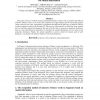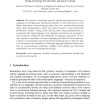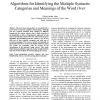220 search results - page 4 / 44 » Syntactic Processing of Unknown Words |
EMNLP
2010
13 years 5 months ago
2010
Polysemy is a major characteristic of natural languages. Like words, syntactic forms can have several meanings. Understanding the correct meaning of a syntactic form is of great i...
AUSAI
2007
Springer
13 years 11 months ago
2007
Springer
Abstract. This paper describes and compares the use of methods based on Ngrams (specifically trigrams and pentagrams), together with five features, to recognise the syntactic and s...
JCIT
2010
13 years 2 months ago
2010
This paper presents a method of using mutual information to improve the recognition algorithm of unknown Chinese words, it can resolve the complexity of weight settings and the in...
ICCPOL
2009
Springer
14 years 2 months ago
2009
Springer
Abstract. We propose a lexicalized syntactic reordering framework for crosslanguage word aligning and translating researches. In this framework, we first flatten hierarchical sourc...
JCP
2008
13 years 7 months ago
2008
The word over, among others, is associated with a great variety of syntactic categories and meanings. Although over has received attention from scholars in different frameworks for...



